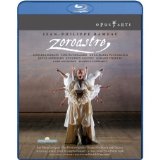| Reviews & Columns |
|
Reviews DVD TV on DVD Blu-ray 4K UHD International DVDs In Theaters Reviews by Studio Video Games Features Collector Series DVDs Easter Egg Database Interviews DVD Talk Radio Feature Articles Columns Anime Talk DVD Savant Horror DVDs The M.O.D. Squad Art House HD Talk Silent DVD
|
DVD Talk Forum |
|
|
| Resources |
|
DVD Price Search Customer Service #'s RCE Info Links |
|
Columns
|
|
|
Zoroastre
For those of you (and you know who you are) who think that Western culture is the be-all end-all of things cultural and artistic, it may be a bit of comeuppance to realize that the Persian mystic Zoroaster has provided us westerners with several pieces of unparalleled art, both literary and musical. There is of course Nietzsche's famous "Also Sprach Zarathustra," which Richard Strauss then transmogrified into one of the most famously gargantuan tone-poems of the late 19th century. But there's also the lesser known opera Zoroastre, by Jean-Philippe Rameau, which receives a consistently engaging and historically "accurate" (in terms of stagecraft) production here by Sweden's Drottingholm Theatre Orchestra and Chorus.
Zoroastrianism is, in essence (like most religions), a meditation on the eternal battle of good versus evil, personified by the God of Light, Ahura Mazda, and Darkness, Angra Mainyu. Zoroastre humanizes this battle by positing two individuals vying for kingship, Zoroastre (our hero), and Abramene, the bad guy. There are also the necessary starcrossed love interests, in this case the evil Erenice, who lusts after Zoroastre, and Amelite, whom Zoroastre loves, but who is lusted after by Abramene. Zoroastre is a thinly veiled allegory of ancient Persian traditions, but it is also, much like Mozart's The Magic Flute, a somewhat opaque rumination on ritual initiation into "higher mysteries," notably Freemasonry. It may sound awfully dry, and in fact it can be (it lacks the lightness of Mozart), but it's surprisingly visceral and an unusual topic for an opera.
Rameau's musical language is couched in a harmonic simplicity (in fact the bulk of the opera is based on i minor, bVI major, iv minor, something that a lot of rock songs would ape three centuries later) around which he is able to weave some startlingly complex vocal music. If Zoroastre, like a lot of Rameau, is a bit recitatif-heavy, with no really soaring melodies for long stretches, it's an amazing historical window into the nascent early stages of an art form that would soon sweep the world. This mostly well-sung production highlights a putatively basic style that reveals, on further examination, some remarkable passages, especially in some of the choral work that becomes more exclamatory in the later acts of the piece (Zoroastre is a five (count 'em) act opera).
What really sets this particular production of Zoroastre apart is its setting--the Drottingholm Theater, which maintains an 18th century array of stage machinery. This gives the entire production an historical veracity that is both charming and unique. While I had some issues with some directorial choices from a filming standpoint (why, for example, place a camera far upstage that shoots the performers from behind?), the actual stagecraft on evidence here is fascinating to watch and, like the opera itself, grants us an invaluable window into times past and how simple things like some amazing scene changes, were handled in times gone by.
This Blu-ray is by its very nature a niche product, but it may find an audience outside of the opera elite by virtue of this very unusual production. The production design itself seems to pick up steam as the opera moves along, perhaps reflective of the "higher levels" of consciousness that Zoroastre is himself attaining. Zoroastre is a captivating trip to a bygone time; it may strike some listeners as musically tame and somewhat repetitive, but the production itself is a marvel to behold.
The Blu-ray
Video:
Zoroastre sports a 1080i image in a 1.78:1 aspect ratio that is for the most part exceedingly sharp and well defined. A lot of this opera is rather dark, and there are some slight contrast issues, especially with some inconsistent black levels. As Zoroastre proceeds to literally lighter levels, things brighten considerably, with well saturated color.
Sound:
Both the DD 2.0 and 5.1 soundtracks are quite excellent. While there's not exceptional separation in the orchestra (probably due to the cramped performance space and the miking issues that that necessitated), there's good directionality in the singing, with excellent fidelity over all frequency ranges. Subtitles are available in English, French, Spanish, German and Italian.
Extras:
Both of the main extras, an illustrated synopsis, and a quite good featurette, "Zoroastre: Discovering an Opera," are recommended for viewing prior to actually watching the main event, especially if you're not that well acquainted with Rameau in general or this piece in particular. There's also a cast gallery.
Final Thoughts:
This is a very unique and engaging production of a lesser known piece of early operatic repertoire. While it doesn't have the soaring melodic content of the grand operas of Verdi or Puccini, Zoroastre has its own more delicate charms, wrapped around a very unusual setting. Recommended.
____________________________________________
"G-d made stars galore" & "Hey, what kind of a crappy fortune is this?" ZMK, modern prophet
|
| Popular Reviews |
| Sponsored Links |
|
|
| Sponsored Links |
|
|
| Release List | Reviews | Shop | Newsletter | Forum | DVD Giveaways | Blu-Ray | Advertise |
|
Copyright 2024 DVDTalk.com All Rights Reserved. Legal Info, Privacy Policy, Terms of Use,
Manage Preferences,
Your Privacy Choices | |||||||














